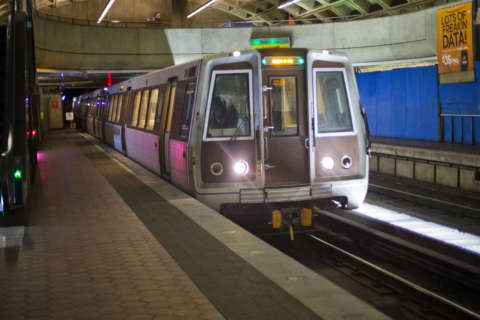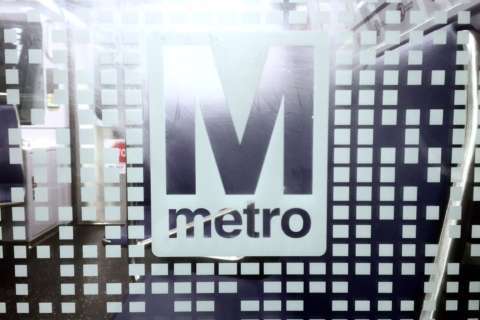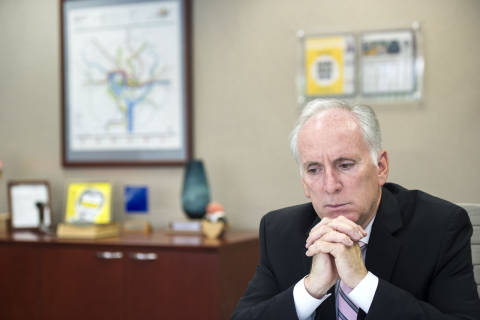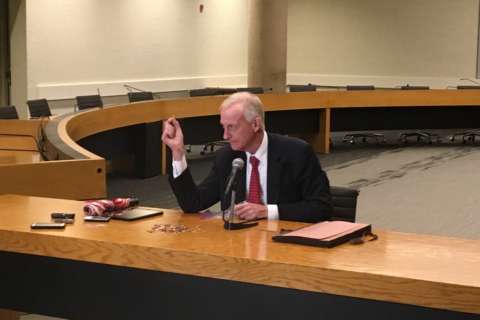WASHINGTON — After the failure to reach a hoped-for regional consensus on how to give Washington’s crumbling Metro system the critical support it needs, former U.S. Transportation Secretary Ray LaHood officially released a series of recommendations Tuesday that will set up even more rounds of debate as the clock ticks toward potential further Metro service cuts.
Metro General Manager Paul Wiedefeld, who was in the front row for the announcement, said that without new funding he would have no option but to cut service in order to pay for critical maintenance and repairs.
“The second he cuts service [begins] a death spiral for the Metro; people are not going to get on it if it’s not reliable,” Virginia Gov. Terry McAuliffe said.
McAuliffe repeated a promise to include some kind of dedicated funding for Metro in his budget proposal, which will be released later this month, just before he leaves office. He said it would be contingent on Maryland and the District each passing their own dedicated funding, and on the region agreeing to a smaller Metro Board. There is no clear path forward for the entire region to reach a deal.
While LaHood agreed there is a financial need, he focused his announcement on a recommendation to temporarily shrink Metro’s Board to five members for three years. He believes what several politicians have long repeated: The state legislatures will not provide more money without the change and a new focus from a more full-time board on the issues at hand.
“To not only improve WMATA, but also encourage people that when they’re providing the money, the money is going to be well used and well spent,” LaHood said.
“In the absence of that, I think things are not really going to improve. … Strong leadership by a smaller group of people who are totally committed to getting WMATA back to number one, it’s just absolutely critical, and frankly that’s our No. 1 recommendation — and obviously the other part of it is the money part,” LaHood added.
Several proposals
This is one of several proposals for board, financial and other changes for Metro put forward by workers, regional business groups, individual politicians and regional elected leaders since Carol Glover died on a smoke-filled train near L’Enfant Plaza nearly three years ago.
“We know there has to be some work done on the pensions … We know we gotta look at some of the bus and rail schedules,” McAuliffe said.
Ultimately, though, he boils the needed changes down to a new board and new money.
“That’s it. We have two issues left and WMATA is solved. That’s it, plain and simple,” McAuliffe said.
Similar issues were raised, and solutions were proposed, more than a decade ago, but the region did nothing and Metro did not immediately begin major rebuilding efforts.
Virginia Transportation Secretary Aubrey Layne said the political will to do it is there this time.
“We don’t need any more studies; it’s up to political will. I think if this doesn’t get done, the people of this region can look to their political leaders and say that’s where it stops right there,” Layne said.
“We need to provide that funding, and we have to give assurances it’s going to be used well. Regardless if that’s factual with the current board or not, the perception is it can’t do it,” Layne said.
Other ideas
Rep. Barbara Comstock, the only Republican member of Congress representing areas with Metro stations, proposed a bill this week that mirrors calls from large business groups for a more powerful reform board than LaHood’s proposal suggests.
That board would have the power to void parts of union contracts and limit workers’ retirement benefits. In exchange for cooperation from Maryland, Virginia and the District in implementing the changes and rewriting the Metro Compact, the federal government would extend special capital contributions to the system for a decade.
LaHood warned Tuesday that opening the compact could be a recipe for disaster since every Congress member and state legislator in the District, Maryland and Virginia could weigh in.
Two Maryland congressmen, Anthony Brown and Jamie Raskin, have introduced a bill that tracks union proposals for improving the system, including changes to the fare structure and increased local tax funding.
D.C. lawmakers have suggested a regional sales tax to fund Metro’s capital needs, which would allow for critical maintenance work to move forward before major governance changes. Del. Eleanor Holmes Norton has called on the entire Metro Board to resign.
A regional Metro Strategy Group comprising state and local legislators has failed to reach an agreement on how to provide additional long-term capital funding for Metro, although Maryland and Virginia leaders have pushed for flexibility that would allow each jurisdiction to determine its own setup for a new tax or assignment of existing funding.
Maryland Gov. Larry Hogan proposed a short-term four-year addition of $125 million each from D.C., Maryland, Virginia and the federal government to buy a little more time before any larger changes.
“How do we get WMATA to be number one again? How do we get WMATA to be the kind of transit system that represents America? You don’t do that by recommending a two-year chintzy plan. This is a big bold vision that takes leadership,” LaHood said of his report.








